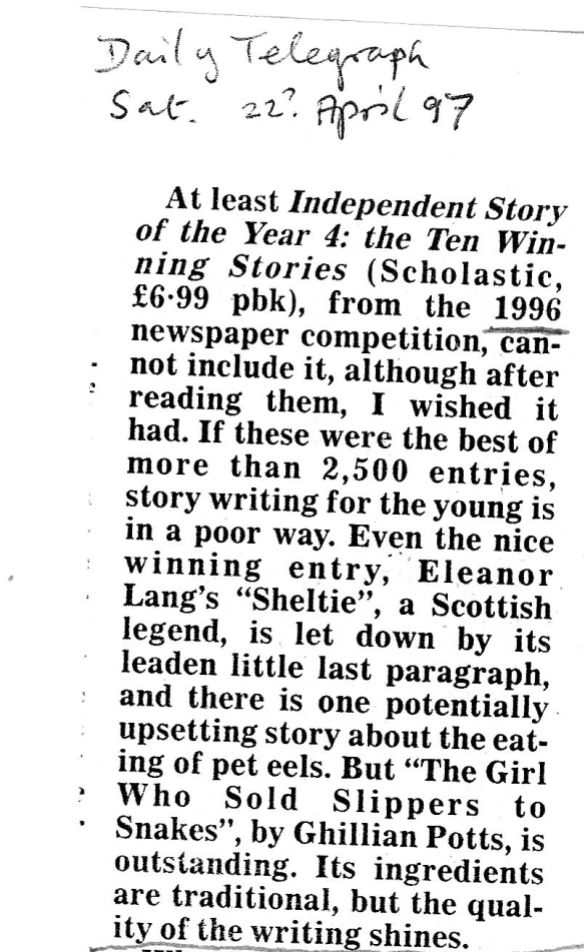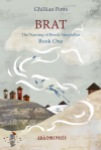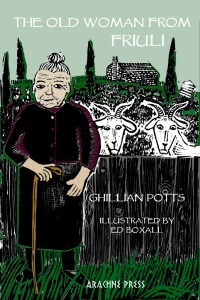A short story from Ghillian Potts
This story is mentioned in Ghil’s forthcoming finale to the Brook Storyteller series, Wolftalker, which is published next month.

The Girl Who Sold Slippers to Snakes
Long ago but not so long as all that, nor so far that you could never reach it, there was a town where lived a woman with one daughter.
The daughter, who was called Stonecrop after the little plant which can flourish even on bare rock, was very clever. She was wise as well as clever; but her mother was not wise. Her mother was very proud of Stonecrop and unwisely she boasted of how clever her daughter was.
“She can cook as well as I can,” boasted the mother. “She can sew with the tiniest stitches you ever saw. She can sing fit to charm the birds themselves and she can talk so well that she could persuade a snake to buy a pair of slippers!”
Now there many other mothers in the town who were quite as proud of their own daughters and they grew very tired of hearing how marvelous Stonecrop was. Perhaps if she had not been as pretty as she was clever, they would not have been so jealous. As it was, three or four of them got together and decided to bring down the pride of Stonecrop’s mother.
They went to the young lord who was the town’s protector and told him that Stonecrop was too clever to be allowed to live in that town.
“Why,” they said, “her own mother says that she can sell slippers to snakes! Whoever heard of such a thing? She must be a witch!”
The young lord did not know that the women were jealous. He did not believe in witches. He just thought that Stonecrop must be very vain and boastful. So he said, “How does one tell a witch? Let her come to my Court of Justice and I will question her. I cannot send her away unjustly.”
The women went away smiling. The first part of their plan was working. Now for the second part! They went to Stonecrop’s mother and told her that the lord himself had heard of Stonecrop’s cleverness and wanted to speak with her next day in the Justice Court.
“You must tell him about her,” they said, “You know how modest she is. She will make no sort of a showing if you don’t speak up for her. But don’t say anything about it to her beforehand; she is so shy!”
Stonecrop’s mother was so puffed up with pride that she suspected nothing. Next day, when the lord’s officers came to tell Stonecrop that the lord wanted her to come to the Court, her mother ran ahead and, as soon as the lord called for Stonecrop to come forward, her mother pushed in front and began to tell him how wonderful her daughter was, just as she always did.
“And she talks so well,” she ended as usual, “that she could surely sell slippers to snakes!”
Stonecrop knew that she could not stop her mother boasting, so she stood quietly waiting in the doorway until her mother finished.
The lord did not see her; he had grown impatient with her mother and now, angry, he exclaimed, “Then she had better go and do so! And never return to this town unless she can prove she has sold slippers to snakes!”
Then Stonecrop stepped forward and bowed to him and he looked and saw her for the first time and wished that he might take back the words he had just spoken. But spoken they were and nothing could alter them now.
However, that lord never afterwards gave any verdict, no matter how convincing the evidence, until after the accused had spoken. So some good came of it.
Stonecrop was hurt and angry at being banished in this way but she said nothing. She packed some clothes and food in a basket, said goodbye to her mother, who was weeping and wailing, and walked out of the town by the nearest gate. She had no idea where to go, so it did not matter which way she went.
She walked and she walked, and presently she came to a village. She asked if there were any snakes nearby.
“There’s a mound where they lie in the sun sometimes,” said the villagers. “We throw stones at them if we see them.”
“Are they poisonous snakes, then?” asked Stonecrop.
“Don’t know,” said the villagers. “Who cares? A snake is a snake.”
Stonecrop went to look. She saw lizards basking in the sun and then she saw the biggest grass snake she had ever seen.
Some of the village children had followed her. They began to throw stones at the snake.
“Leave it alone! It can’t hurt you. Why kill a harmless snake?” asked Stonecrop.
“It’s a snake!” yelled the boys. Stonecrop didn’t bother to argue. She stood over the snake to shield it. The boys did not dare throw stones at her. They went away.
It was getting late. “I can’t go to the village for shelter now,” she said aloud to herself. “Where shall I go?”
As she stood gazing around her, the huge grass snake uncoiled itself.
Stonecrop started away from it in alarm. Then she remembered that it was only a grass snake and she stood still and watched it.

It reared up its head and seemed to inspect her, then turned and glided between the trees away from the road. Stonecrop hesitated for a moment, then followed it. The snake led her stealthily through the trees, across a small field and into a hollow filled with low bushes.
In the middle, so sunk into the ground and overgrown with mosses that it was almost invisible, was a tiny house.
The snake slid up to the door and drew itself slowly under it, into the house.
Stonecrop watched until its tail tip had vanished, then went and knocked gently on the door. There was a faint scuffling sound from inside, then silence.
Stonecrop called out, “If you please! Your friendly snake led me here. Will you tell me where I may find shelter for the night?”
The door creaked open, just a crack, and someone peered at her. Then the door was opened wide and there stood a little old man, the smallest and ugliest Stonecrop had ever seen.
“If’n you bain’t afraid of snakes,” the old man said, in a voice as creaky as his door, “you c’n stay the night here.”
Stonecrop thanked him. “I’m certainly not afraid of harmless snakes,” she said. “But,” she added cautiously, “I am scared of poisonous ones.”
The ugly old man grinned at her. “I ain’t got no poisonous snakes,” he told her. “Never worry, girl.”
Even the grass snake seemed to have vanished. So Stonecrop spent the night quite peacefully. In the morning she told the old man her story.
“That is why I was willing to follow your snake,” she explained. “I must find some way to make everyone think that I have sold slippers to at least one snake, or never go home again. And what earthly use could a snake have for slippers?”
“No money to pay for ‘em, neither,” said the little old man.
“It’s hopeless,” said Stonecrop. “I haven’t any slippers to sell, in any case!”
“Make some,” said the old man.
Stonecrop thought and thought. Then she took long strong grasses and wove them into slippers.
“I have slippers,” she said to the old man. “Now, how would a snake use them?”
The old man said, “Snakes like warmth.”
Stonecrop thought some more. “Would your snake sleep in a slipper of grass?” she asked.
The old man nodded.
“Will you let me take your snake back to the town with me?”
“You saved him from the stones. He’ll go with you,” said the old man.
“But what about payment?” said Stonecrop. “I can’t say I’ve sold the slipper if I haven’t been paid!”
“Snakes go under the ground as well as on it,” said the old man. He went into the house.
Presently the big grass snake came sliding out. It lowered its head and dropped something at Stonecrop’s feet. When she picked it up, she found it was a ruby as large as her little fingernail.
“But this is far too much!” she said.
The snake glided towards the road. It seemed to beckon impatiently with its tail. So Stonecrop followed it. She called goodbye and thanks to the old man but he did not come out or answer.
“I’ll come back and thank him properly later,” she said to herself.
The snake led her to a short cut. When she was sure of the way, Stonecrop carried it in her basket. It could not travel as fast and far as she could.
At last they came in sight of the town. Stonecrop let the snake coil around her shoulders. “You’ll be safer there,” she told it.
Everyone was very surprised to see her come back so soon and with a snake draped round her.
“Here is the snake I have sold a slipper to,” Stonecrop told them, “and here is the payment.”
When they saw the ruby, they ran to the lord’s house to tell him. He came to meet Stonecrop and she told everyone how she had saved the snake and made it a slipper of grass. The snake coiled itself up in the slipper and everyone could see that it was pleased with it.
“Now,” said Stonecrop, “I have done as you said and am no longer banished. But I will not stay here. I mean to go and live on my own, once I have taken this snake back to the old man.”
And she refused to listen to anyone’s persuasion. She gave the ruby to her mother and went on her way. Some of the townspeople tried to follow her, but the snake hissed at them so loudly that they were scared and ran back.
When Stonecrop got back to the hollow, the hut was gone. The little old ugly man was gone, too. Stonecrop was bewildered. She set the snake down in the grass.
“Can you find him?” she asked the snake. “I must thank him properly.”
The snake reared up its head and looked at her. It seemed to want her to do something. Stonecrop stroked it gently and then looked away. When she looked back, the little old man stood there. The snake had gone.
“I do believe you’re the snake!” cried Stonecrop, staring at him.
The old man grinned at her. “Took you long enough,” he said.
Stonecrop flung her arms around him and kissed him. “Thank you,” she began – and then jumped back with a gasp. The little old man was growing and changing! He was taller than Stonecrop and young and good-looking! He was laughing with joy.
“Thank you, Stonecrop,” he said. “You have broken both the spells that bound me. A wizard set them so that I must be a snake for half the time and an ugly old man the other half. Once someone knew the old man for the snake, I would be the old man all the time; and once a girl kissed me, ugly as I was, I would regain my real form. Will you marry me, Stonecrop?”
Stonecrop said, “I liked you when you were a snake and I liked you when you were an ugly old man. I think I like you enough to marry you! But what shall we live on?”
“While I was a snake,” said the young man, “I found many jewels in the ground. And as a little old man, I polished them. I think we shall have enough to live on.”
So they were married and lived as happily and as long as was good for them.
Previously published in Independent Story of the Year 4: the Ten Winning Stories (Scholastic 1997) There’s a rather mean review of the book as a whole below, which singles out this story as ‘…Outstanding. Its ingredients are traditional but the quality of the writing shines.’

Like this:
Like Loading...











 The orchards bore more fruit, the fields seemed more fertile and the Lady Forlorn smiled once more. She could even afford to rebuild several of the more tumbledown houses in the village. She also bought a carnelian necklace and earrings, which she wore daily.
The orchards bore more fruit, the fields seemed more fertile and the Lady Forlorn smiled once more. She could even afford to rebuild several of the more tumbledown houses in the village. She also bought a carnelian necklace and earrings, which she wore daily.

 Just taken delivery of the advance copies of
Just taken delivery of the advance copies of  Here’s a recording of
Here’s a recording of 


